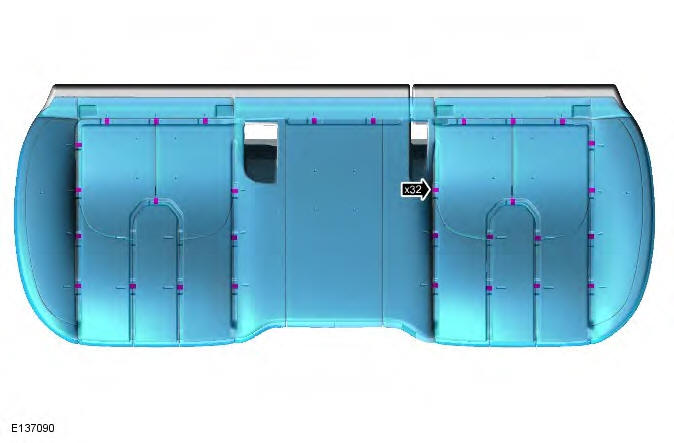Range Rover Evoque: Rear Seat Cushion Cover
Removal
NOTE: Removal steps in this procedure may contain installation details.
1. Prior to carrying out the step by step procedure below, Steps 2
and 3 must be followed for knowledge on how to correctly install
and care for the seat cover.
2.

3.

4. If required, follow the steps below to carry out the removal and
installation procedure.
5. Refer to: Rear Seat Cushion (501-10 Seating, Removal and
Installation).
6.

7. NOTE: Make sure that new hog rings are installed.

Installation
1. NOTES:
If a replacement rear seat backrest cover is to be
installed, cut out holes for the head restraint guide
tubes and center safety belt trim panel. Use the
existing rear seat backrest cover as a template. This
also applies to the backrest squab foam.
Use hog ring pliers to close the hog rings. Do not
use any other tool. The hog rings must be closed to
overlap as illustrated.
Make sure that new hog rings are installed.

2. NOTE: Make sure that the hogrings are installed in the
sequence shown.

3. NOTE: Make sure that the hogrings are installed in the
sequence shown.

4. To install, reverse the removal procedure.
READ NEXT:
Removal
WARNINGS:
To avoid accidental deployment and possible personal injury, the backup
power supply must be depleted before
repairing or replacing any air bag supplemental restraint system (SRS)
Removal
NOTES:
This procedure covers the removal and installation of both rear seat
backrests and the LH rear seat backrest cover.
The RH rear seat backrest cover is similar. All notes and cautions
Removal
NOTE: Removal steps in this procedure may contain installation details.
All vehicles
1. Disconnect the battery ground cable.
Refer to: Specifications (414-01 Battery, Mounting and Cables,
Spe
SEE MORE:
Anti-Theft - Passive - Component Location
COMPONENT LOCATION
Instrument cluster
Start/stop button
Radio Frequency (RF) receiver
Interior antennas
Keyless Vehicle Module (KVM)
Immobilizer Antenna Unit (IAU)
Electric steering column lock
BJB (battery junction box)
Battery
CJB (central junc
Removal
1. WARNING: Make sure to support the vehicle with axle stands.
Raise and support the vehicle.
2. Refer to: Exhaust System (309-00B Exhaust System - TD4 2.2L
Diesel, Removal and Installation).
3. CAUTION: Make sure that the driveshaft is
supported with suitable retaining straps.
4. CAUTIONS:
© 2011-2025 Copyright www.rrevoque.org










